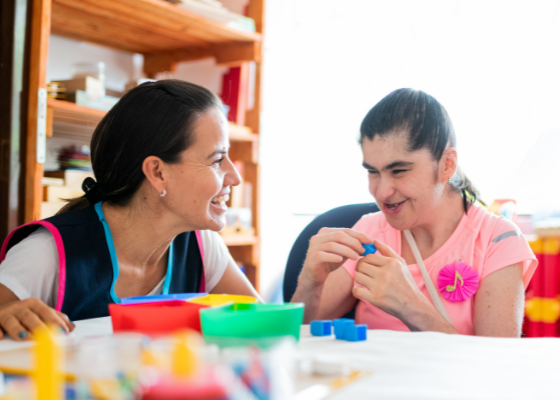Across MacIntyre, we're dedicated to keeping the people we support safe. Keeping people safe can take several forms.
For the Ann Craft Trust's National Safeguarding Adults Week, we're sharing just some of the ways we build and maintain a safe culture at MacIntyre.
What is a safe culture?
According to the Ann Craft Trust, creating safe cultures focuses on including voices of people less likely to raise concerns and promoting reflection and learning in safeguarding practice.
Supporting people to identify abuse
My Voice Group
Our My Voice groups across the country provide an opportunity for the people we support to share their views and discuss important issues, including how to keep safe.
Day-to-day safeguarding
This may include supporting someone to navigate their day-to-day life and make decisions that will support their wellbeing. Our teams across MacIntyre support many people to handle their finances, support them to stay safe online and speak up if they feel any concern about their own safety or someone else's safety.
Cassandra a member of our team at MacIntyre was inspired to get creative to help Bess, a lady she supports who doesn't use words to communicate, to identify abuse.
"We have been looking at ways to make safeguarding more personal and relevant to people we support. I felt that Bess would enjoy working on this together. Bess would not easily pick up on possible signs of abuse and there would be the added complication of how she would let people know her concerns. This is something that she really struggles with, especially with people she doesn’t know, so I felt this would be a really good skill to learn.”

To communicate, Bess often uses a pictorial rota as well as photos to show her what is happening 'now' and what will be happening 'next'.
Knowing this was how Bess was already communicating, Cassandra used this as the basis for their work on safeguarding.
"I knew Bess likes to play games, so I developed a pack of cartoons around good interactions and bad interactions. I started by looking online for good cartoons that weren’t too abstract but were clear and bright."
"The next stage was to play our interactions game and help develop Bess’s skills around social interaction; what she classed as a nice interaction and a bad interaction. We used sign language, including thumbs up and thumbs down and started to play ‘good or bad interaction’.
Cassandra added:
"This took a few goes with me explaining the photos and using sounds that would relate to pain or being upset, to laughing when a photo showed happiness. Bess began repeating what I was saying and she soon started to recognise the 'bad' interactions. She would point and say 'no pain' or start laughing at the photos with people shaking hands."
Working in this way, Cassandra was able to break down the complexities of abuse for Bess to process.
"I feel Bess has a better understanding of what is abuse and that would upset her, this is now something that we can build on together to further develop her understanding of the many different types of abuse and how to make someone aware."
Supporting our staff to create a safe culture
The Safeguardian
The Safeguardian is a newsletter that goes out to MacIntyre staff, with key information to help staff to identify different types of abuse.

MacIntyre's Safeguarding Group
Any incidents are reported and collated centrally and recounted at the quarterly Safeguarding Group meetings. These meetings are chaired by an operational Director and attended by the CEO of the Ann Craft Trust as an external expert.
The group reviews all safeguarding incidents, shares knowledge and reflects on organisational experiences in order to continuously improve MacIntyre’s safeguarding practice. Representatives from every area of the organisation then disseminate knowledge and learning within their teams.
Safeguarding training
Staff at every level of the organisation undertake safeguarding training. A key part of this is the message of ‘if in doubt, raise it’ in reference to any concerns or queries that staff may have, and enforcing the knowledge that MacIntyre will always support anyone who raises a concern in good faith.